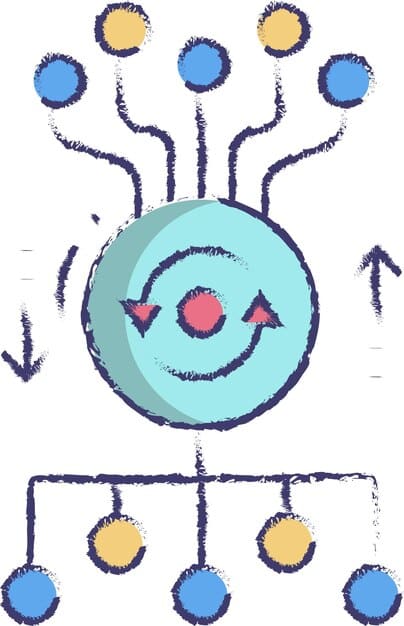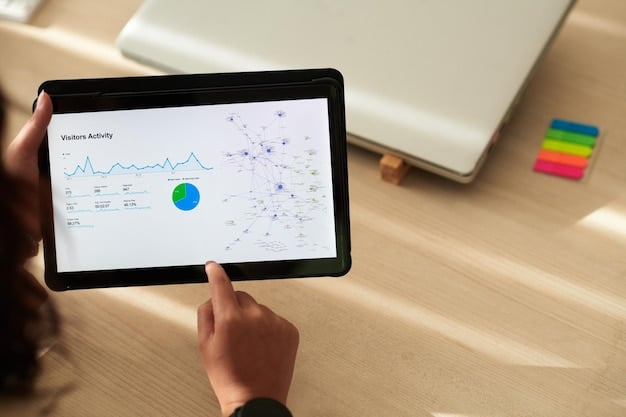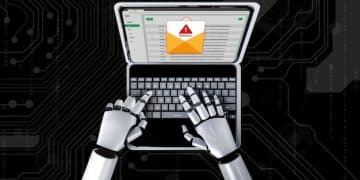AI Marketing Automation: Boost Leads by 25% with AI

AI marketing automation can significantly enhance lead generation; studies suggest that businesses using AI-powered tools can experience up to a 25% increase in lead generation efficiency.
Can AI automate your marketing? See a 25% increase in lead generation – a promise many businesses are chasing. With the rise of sophisticated algorithms and machine learning, the prospect of streamlining marketing efforts and boosting lead acquisition through artificial intelligence is becoming increasingly tangible and transforming marketing strategies across various industries.
Unlocking the Power of AI in Marketing Automation
Artificial intelligence is reshaping how marketers approach their campaigns. But what exactly does it mean to harness AI for marketing automation, and how can it lead to such a substantial increase in lead generation? We will delve into how AI is transforming marketing processes and explore practical ways to implement these technologies.
What is AI Marketing Automation?
AI marketing automation involves using artificial intelligence technologies to automate repetitive marketing tasks, analyze data, and make informed decisions.
Benefits of AI in Marketing
AI is changing the marketing landscape by increasing efficiency and optimizing results through technologies like machine learning. Here are the main benefits:
- Improved efficiency: AI handles repetitive and time-consuming tasks, freeing up marketers to focus on strategic initiatives.
- Personalized customer experiences: AI algorithms analyze customer data to deliver tailored content and product recommendations, boosting engagement and conversion rates.
- Enhanced lead generation: AI identifies high-potential leads by analyzing vast datasets, allowing marketing teams to prioritize and target the most promising prospects.
AI-driven automation is not just about automating tasks; it’s about making marketing smarter, more efficient, and more effective and creating marketing solutions that increase sales. By leveraging the capabilities of AI, organizations can transform their marketing approach and achieve significant improvements in lead generation.
Identifying Your Automation Opportunities
Before diving into AI-powered tools, it’s crucial to identify the key areas in your marketing strategy ripe for automation. Understanding which tasks can be streamlined will create a solid foundation that can leverage AI. Understanding your business needs is the first step toward automating your marketing.
Analyzing Existing Workflows
Begin by thoroughly reviewing all current marketing activities and workflows. Pinpoint repetitive tasks, data-heavy processes, and areas where human error is common.
Areas for AI Automation
Look for opportunities where AI can improve specific aspects of your marketing strategy, focusing on efficiency and personalization is key.
- Email Marketing: Automate personalized email campaigns based on customer behavior and preferences, ensuring timely and relevant communication.
- Social Media Management: Use AI-powered tools to schedule posts, analyze engagement, and optimize content for maximum reach.
- Content Creation: Employ AI to generate initial drafts of blog posts, social media updates, and product descriptions, saving time and resources.
Identifying specific automation opportunities within your marketing strategy is essential for implementing AI-driven tools effectively. This assessment allows marketers to strategically apply AI, maximizing efficiency, personalization, and overall impact on lead generation efforts.

Selecting the Right AI Tools for Lead Generation
With numerous AI-powered tools available, choosing the right solutions that will help to generate leads is critical. The right tools can greatly accelerate success, whereas the wrong ones can lead to wasted resources. This allows for efficiency in the marketing process.
Key Features to Look For
When comparing AI tools, consider factors such as data integration, customization, ease of use, and reporting capabilities.
AI-Powered Lead Generation Tools
Explore specific AI tools designed to enhance lead generation, such as chatbots, lead scoring systems, and predictive analytics platforms.
- HubSpot: Offers AI-driven features for marketing automation, sales, and customer service, providing comprehensive lead generation and management capabilities.
- Pipedrive: Incorporates AI to automate sales activities, predict lead conversion rates, and help sales teams prioritize their efforts for better results.
- Marketo: Provides AI-powered marketing automation tools for personalization, lead nurturing, and campaign optimization, enhancing the overall customer journey.
Investing in the right AI tools is essential for maximizing the impact of your marketing automation efforts. By carefully evaluating the features, capabilities, and integration options of different AI solutions, marketers can strategically select tools that align with their specific needs and objectives.
Implementing AI in Key Marketing Channels
Integrating AI across various marketing channels can drastically improve the effectiveness of your campaigns so it is important to know how to implement AI in key channels. To illustrate this point, here are AI implementations across key marketing channels.
AI in Email Marketing
Use AI to personalize email content, optimize send times, and segment audiences for more targeted campaigns. These are very effective in increasing market share.
AI in Social Media Marketing
Leverage AI to analyze social media trends, automate content posting, and identify potential leads based on engagement. Through automation, your social media campaigns can improve substantially with AI.

AI in Content Marketing
AI can help marketers create more engaging and personalized content, which can lead to a significant improvement in lead generation. AI tools can also assist in optimizing content for search engines.
Integrating AI into key marketing channels involves strategically applying AI-powered tools and technologies to enhance efficiency, personalization, and lead generation. AI can drive significant improvements in marketing performance and create more meaningful customer interactions.
Measuring the Impact of AI Automation
Measuring the impact of AI automation is crucial for assessing its effectiveness and optimizing marketing strategies. In this stage, it is important to monitor Key Performance Indicators (KPI). This allows for data driven marketing decisions.
Key Performance Indicators (KPIs)
Track metrics such as lead conversion rates, cost per lead, customer engagement, and ROI to evaluate the success of your AI initiatives.
Tools for Tracking and Reporting
Utilize analytics platforms and reporting tools to monitor AI performance, identify areas for improvement, and demonstrate the value of AI investments. Several automation tools can measure the ROI of marketing efforts with AI.
Measuring the impact of AI automation is essential for continuously improving marketing strategies and demonstrating the value of AI investments. By monitoring relevant KPIs, using analytics platforms, and conducting A/B tests, marketers can gain insights into AI performance, optimize their approaches, and achieve better lead generation outcomes.
Overcoming Challenges in AI Implementation
Implementing AI can present challenges. However, understanding these obstacles and proactively addressing them can pave the way for successful AI adoption. Let’s examine these challenges.
Data Quality and Integration
Ensure data is accurate, up-to-date, and properly integrated across systems to maximize the effectiveness of AI algorithms.
Skills and Training
Invest in training programs to equip your team with the skills needed to manage and utilize AI tools effectively.
Ethical Considerations
Address ethical concerns related to data privacy, algorithmic bias, and transparency to maintain customer trust and compliance.
Overcoming challenges in AI implementation requires proactive planning, investment in data quality and skills training, and attention to ethical considerations. By addressing these obstacles, organizations can unlock the full potential of AI and achieve significant improvements in marketing automation and lead generation.
| Key Point | Brief Description |
|---|---|
| 🚀 AI Automation | Automates marketing tasks, enhancing efficiency. |
| 🎯 Lead Generation | Boosts leads by personalizing customer interactions. |
| 📈 Increase of 25% | Achieves significant lead generation gains. |
| ⚙️ Implementation | Requires strategic planning and the right tools from platforms like HubSpot, Pipedrive and Marketo. |
FAQ
AI marketing automation uses artificial intelligence to streamline repetitive marketing tasks and make data-driven decisions, greatly improving efficiency.
AI enhances lead generation by analyzing data to identify high-potential leads, personalizing customer experiences, and automating marketing processes.
The key benefits include improved efficiency, personalized customer experiences, better lead generation, and optimized marketing campaigns for higher ROI.
Tools like HubSpot, Pipedrive, and Marketo offer AI-driven capabilities that automate marketing tasks, analyze data, and improve overall marketing outcomes.
Challenges include ensuring data quality, training staff to use new tools, and addressing ethical considerations like data privacy and algorithmic bias.
Conclusion
In conclusion, AI marketing automation offers a transformative approach to boost lead generation. By strategically implementing AI tools, businesses can see substantial improvements in efficiency and personalization, potentially achieving a 25% increase in lead generation.





